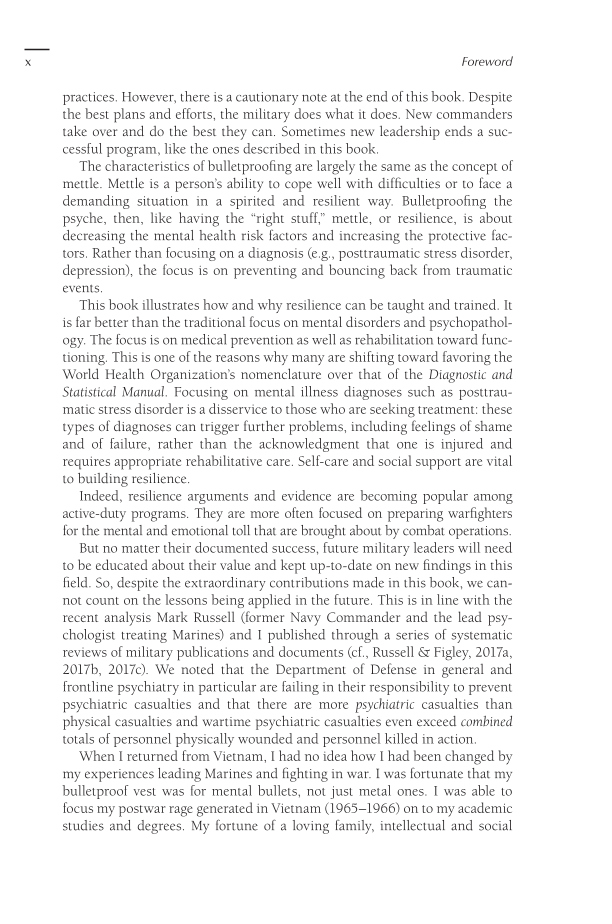x Foreword practices. However, there is a cautionary note at the end of this book. Despite the best plans and efforts, the military does what it does. New commanders take over and do the best they can. Sometimes new leadership ends a suc- cessful program, like the ones described in this book. The characteristics of bulletproofing are largely the same as the concept of mettle. Mettle is a person’s ability to cope well with difficulties or to face a demanding situation in a spirited and resilient way. Bulletproofing the psyche, then, like having the “right stuff,” mettle, or resilience, is about decreasing the mental health risk factors and increasing the protective fac- tors. Rather than focusing on a diagnosis (e.g., posttraumatic stress disorder, depression), the focus is on preventing and bouncing back from traumatic events. This book illustrates how and why resilience can be taught and trained. It is far better than the traditional focus on mental disorders and psychopathol- ogy. The focus is on medical prevention as well as rehabilitation toward func- tioning. This is one of the reasons why many are shifting toward favoring the World Health Organization’s nomenclature over that of the Diagnostic and Statistical Manual. Focusing on mental illness diagnoses such as posttrau- matic stress disorder is a disservice to those who are seeking treatment: these types of diagnoses can trigger further problems, including feelings of shame and of failure, rather than the acknowledgment that one is injured and requires appropriate rehabilitative care. Self-care and social support are vital to building resilience. Indeed, resilience arguments and evidence are becoming popular among active-duty programs. They are more often focused on preparing warfighters for the mental and emotional toll that are brought about by combat operations. But no matter their documented success, future military leaders will need to be educated about their value and kept up-to-date on new findings in this field. So, despite the extraordinary contributions made in this book, we can- not count on the lessons being applied in the future. This is in line with the recent analysis Mark Russell (former Navy Commander and the lead psy- chologist treating Marines) and I published through a series of systematic reviews of military publications and documents (cf., Russell & Figley, 2017a, 2017b, 2017c). We noted that the Department of Defense in general and frontline psychiatry in particular are failing in their responsibility to prevent psychiatric casualties and that there are more psychiatric casualties than physical casualties and wartime psychiatric casualties even exceed combined totals of personnel physically wounded and personnel killed in action. When I returned from Vietnam, I had no idea how I had been changed by my experiences leading Marines and fighting in war. I was fortunate that my bulletproof vest was for mental bullets, not just metal ones. I was able to focus my postwar rage generated in Vietnam (1965–1966) on to my academic studies and degrees. My fortune of a loving family, intellectual and social
Document Details My Account Print multiple pages
Print
You have printed 0 times in the last 24 hours.
Your print count will reset on at .
You may print 0 more time(s) before then.
You may print a maximum of 0 pages at a time.































































































































































































































































































